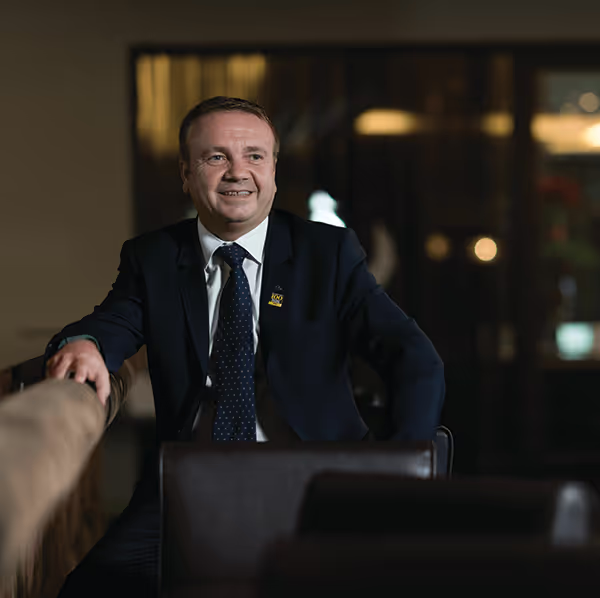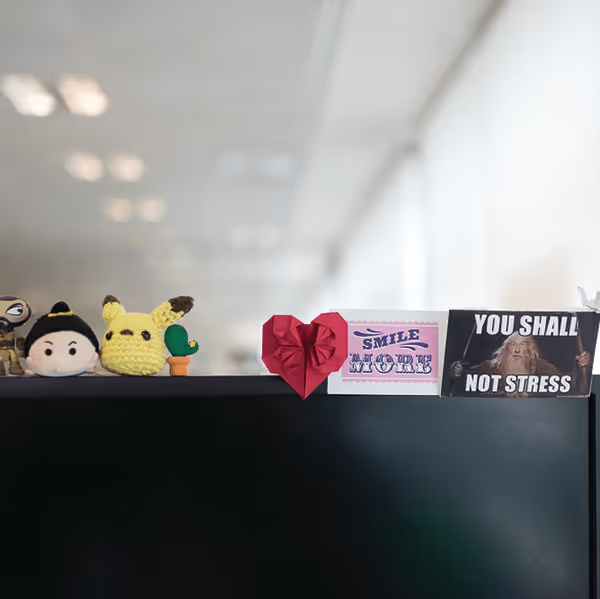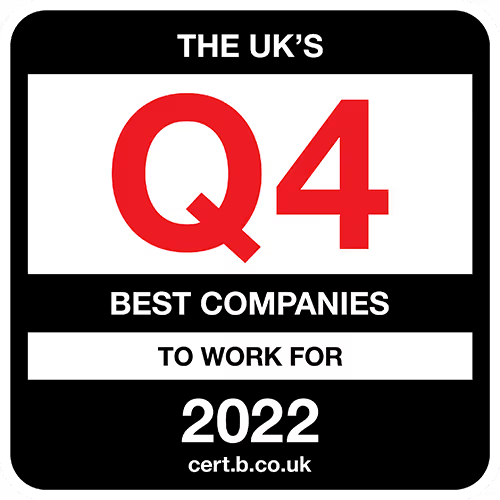State of Engagement 2026 Report |
Download report

Officially a Very Good
Company to Work For
Officially a Very Good
Company to Work For
Officially an Outstanding
Company to Work For
Officially an Outstanding
Company to Work For
Officially a World Class
Company to Work For
Officially a Good
Company to Work For
Officially a Good
Company to Work For
Officially a Global*
Good Company
to Work For
Officially a Good
Company to Work For
Globally*

CONNEXIONS WAS SET up to target the hundreds of thousands of school-leavers not in education, employment and training (Neets). Official figures show it has its work cut out, with a record number of Neets in England at the end of 2009. Greater Merseyside Connexions Partnership helps teenagers and adults up to the age of 25, giving advice on education, careers, housing, money, health and relationships. Its employees say their own career prospects are sound, giving a 71% positive score when asked if the experience they have from their job will prove valuable in future (beaten by just 12 other mid-sized organisations). They view working at Connexions as good for their growth (70%), stimulating (68%) and the training they receive as of great benefit (57%). On average, employees receive 70 hours per year formal training, which sets the organisation back £500 each. They take courses covering areas such as health and safety policy, mentoring and interviewing skills. In a study released last year, former cabinet minister Alan Milburn called for the service to be broken up because, he said, it seemed to have "focused on the disadvantaged minority to the detriment of the aspirational majority". The government has not acted on this advice, but employees at Greater Merseyside Connexions Partnership are nevertheless worried for the future (26% positive, ranking it 47th on the list of mid-size organisations). There were 32 voluntary redundancies in 2008-9. They disagree with Milburn's verdict on the work they do, however, insisting that Connexions provides a great service (79%, and the 12th highest score for this question). Employees also say the work they do is an important part of who they are (75%, and 15th). Staff feel they receive reasonable pay and benefits for their line of work, giving a 60% rating for questions in the Fair Deal section, the 19th highest nationally. Nine out of 10 people earn £35,000 or less a year, with 60% on £25,000 or below. Personal advisers are typically paid about £28,000 a year and the average length of service is 10 years. People are among the happiest about their pay and benefits (66%, a top 10 score for mid-sized bodies). The workforce say their roles do not interfere with their responsibilities at home (67%, another top 10 score) and their health is not suffering because of their job (70%). Staff Wellbeing scores 58% positive overall, ranking it 26th, and Connexions people rate the My Team factor at 72% positive (and 23rd overall among the top 75 bodies). Colleagues care for each other (77%, a top 15 score for mid-sized institutions). www.connexions-gmerseyside.co.uk
I believe I can make a valuable contribution to the success of this organisation
Managers at GMCP have regular KITs with their staff, which involve reviewing performance. These meetings are also used to discuss any issues and to ensure that the expectations of both parties are consistent. To enable transparency and ease of use they have devised an easy performance monitoring system, based on traffic lights, which clearly show individual performance against targets. The Managers demonstrate understanding for individuals' workload and pressures in work. Respect employees' life outside of work: time for family, friends and outside interests/hobbies
GMCP managers ensure that all their staff are aware of and have access to flexible working arrangements. Managers also monitor staff hours to ensure that staff are not over working and that any accrued hours are taken.
People in my team go out of their way to help me
At GMCP a staff Working Group has recently been established, to bring staff wellbeing issues to the fore, and create a culture where negative issues are identified, minimised and managed before they affect the health of staff. They are working with a small team of staff (20 volunteers) who are helping through: Attendance at meetings, focus groups in their own teams, highlighting triggers, making suggestions for reducing the negative impact of work, offering ideas and solutions to promote a greater sense of wellbeing and one that everyone enjoys… trying out different approaches to identify what works for them. They have a budget of £1,000 to test out ideas and make recommendations for a programme that will be rolled out by March 2014. Friday afternoon Reiki sessions at thier Head Office are booking up fast! In establishing the group, they were especially keen to include people who understand how work can add to stress levels, through personal experience. They also appealed for volunteers who rarely feel stressed or are more resilient to the pressures work – so that they can better promote a healthy work-life balance. Through this Project Team, thye are designing a programme of support that is relevant and accessible to all staff and helps them reduce the negative impact of work on their lives. They already have a free Medicash scheme, providing access to doctors, counselling / therapies but GMCP want to do more to tailor a bespoke package of support available on site, at the right times for their staff
I feel that my manager talks openly and honestly with me
At GMCP a staff Working Group has recently been established, to bring staff wellbeing issues to the fore, and create a culture where negative issues are identified, minimised and managed before they affect the health of staff. They are working with a small team of staff (20 volunteers) who are helping through: Attendance at meetings, focus groups in their own teams, highlighting triggers, making suggestions for reducing the negative impact of work, offering ideas and solutions to promote a greater sense of wellbeing and one that everyone enjoys… trying out different approaches to identify what works for them. They have a budget of £1,000 to test out ideas and make recommendations for a programme that will be rolled out by March 2014. Friday afternoon Reiki sessions at thier Head Office are booking up fast! In establishing the group, they were especially keen to include people who understand how work can add to stress levels, through personal experience. They also appealed for volunteers who rarely feel stressed or are more resilient to the pressures work – so that they can better promote a healthy work-life balance. Through this Project Team, thye are designing a programme of support that is relevant and accessible to all staff and helps them reduce the negative impact of work on their lives. They already have a free Medicash scheme, providing access to doctors, counselling / therapies but GMCP want to do more to tailor a bespoke package of support available on site, at the right times for their staff

I believe I can make a valuable contribution to the success of this organisation








Managers at GMCP have regular KITs with their staff, which involve reviewing performance. These meetings are also used to discuss any issues and to ensure that the expectations of both parties are consistent. To enable transparency and ease of use they have devised an easy performance monitoring system, based on traffic lights, which clearly show individual performance against targets. The Managers demonstrate understanding for individuals' workload and pressures in work. Respect employees' life outside of work: time for family, friends and outside interests/hobbies
GMCP managers ensure that all their staff are aware of and have access to flexible working arrangements. Managers also monitor staff hours to ensure that staff are not over working and that any accrued hours are taken.









People in my team go out of their way to help me








At GMCP a staff Working Group has recently been established, to bring staff wellbeing issues to the fore, and create a culture where negative issues are identified, minimised and managed before they affect the health of staff. They are working with a small team of staff (20 volunteers) who are helping through: Attendance at meetings, focus groups in their own teams, highlighting triggers, making suggestions for reducing the negative impact of work, offering ideas and solutions to promote a greater sense of wellbeing and one that everyone enjoys… trying out different approaches to identify what works for them. They have a budget of £1,000 to test out ideas and make recommendations for a programme that will be rolled out by March 2014. Friday afternoon Reiki sessions at thier Head Office are booking up fast! In establishing the group, they were especially keen to include people who understand how work can add to stress levels, through personal experience. They also appealed for volunteers who rarely feel stressed or are more resilient to the pressures work – so that they can better promote a healthy work-life balance. Through this Project Team, thye are designing a programme of support that is relevant and accessible to all staff and helps them reduce the negative impact of work on their lives. They already have a free Medicash scheme, providing access to doctors, counselling / therapies but GMCP want to do more to tailor a bespoke package of support available on site, at the right times for their staff









I believe I can make a valuable contribution to the success of this organisation








Managers at GMCP have regular KITs with their staff, which involve reviewing performance. These meetings are also used to discuss any issues and to ensure that the expectations of both parties are consistent. To enable transparency and ease of use they have devised an easy performance monitoring system, based on traffic lights, which clearly show individual performance against targets. The Managers demonstrate understanding for individuals' workload and pressures in work. Respect employees' life outside of work: time for family, friends and outside interests/hobbies
GMCP managers ensure that all their staff are aware of and have access to flexible working arrangements. Managers also monitor staff hours to ensure that staff are not over working and that any accrued hours are taken.









Companies offering a minimum of 26 days annual leave to all employees.

Companies where at least 40% of the staff have worked there for more than five years.

Companies offering a final salary scheme to all employees, or one in which the employer's contribution is at least 5%.

At least 40% of senior managers are women.




If you like what you see here and would like to know more about working for a
Ones to Watch
organisation, simply click the link for further information about careers with
Greater Merseyside Connexions Partnership
.